Pre-employment screening helps companies find the best talent. It gives recruiters a clear picture of a candidate's skills and qualities before hiring.
This guide compares Adaface and Ducknowl, two popular assessment platforms. We'll look at their features to help you choose the right tool for your hiring needs.
Explore this post with:
Table of contents
How does Adaface work?
Adaface is an innovative assessment platform known for creating a friendly and engaging experience for candidates. By leveraging conversational AI, Adaface offers tests that feel more like interactions than exams.
Recruiters use Adaface to streamline their hiring process. Custom tests tailored to job descriptions allow them to assess candidates accurately, reducing the chances of hiring mismatches. This level of customization means more precise job matching.
Another major use case for recruiters is Adaface’s extensive range of tests. From programming and aptitude tests to language and business skills assessments, Adaface covers the whole spectrum, enabling recruiters to evaluate a wide array of skills.
Adaface’s remote proctoring features ensure integrity by monitoring candidate activity throughout the test. This, combined with ATS integrations, makes it a versatile tool for enterprise-level recruitment.
How does Ducknowl work?
Ducknowl is an assessment platform designed to streamline candidate evaluation using a mix of pre-built and customizable tests. It focuses on various skill assessments, primarily concentrating on technical skills across programming and aptitude areas.
Within Ducknowl, users can create assessments that include programming tests and aptitude tests. For instance, a recruiter could set up a coding challenge for software engineers to evaluate their problem-solving skills in real-world scenarios, while also assessing logical reasoning through traditional aptitude questions.
Some key features of Ducknowl include ready-to-use tests and the ability to track candidate scores, which makes it easier for recruiters to compare candidates. Additionally, they offer quiz formats that can reduce the pressure on candidates during assessments.
However, Ducknowl may lack in areas like custom question creation and more diverse test categories. This means recruiters might have a narrower selection when designing tests tailored to specific roles or competencies.
Adaface vs Ducknowl: Test libraries
Adaface and Ducknowl both offer extensive test libraries. While Adaface covers over 500 skills, Ducknowl provides programming, aptitude, typing, and job-specific tests.
Recruiters can leverage these libraries to screen candidates effectively, ensuring the right hires for specialized roles.
Adaface's test library
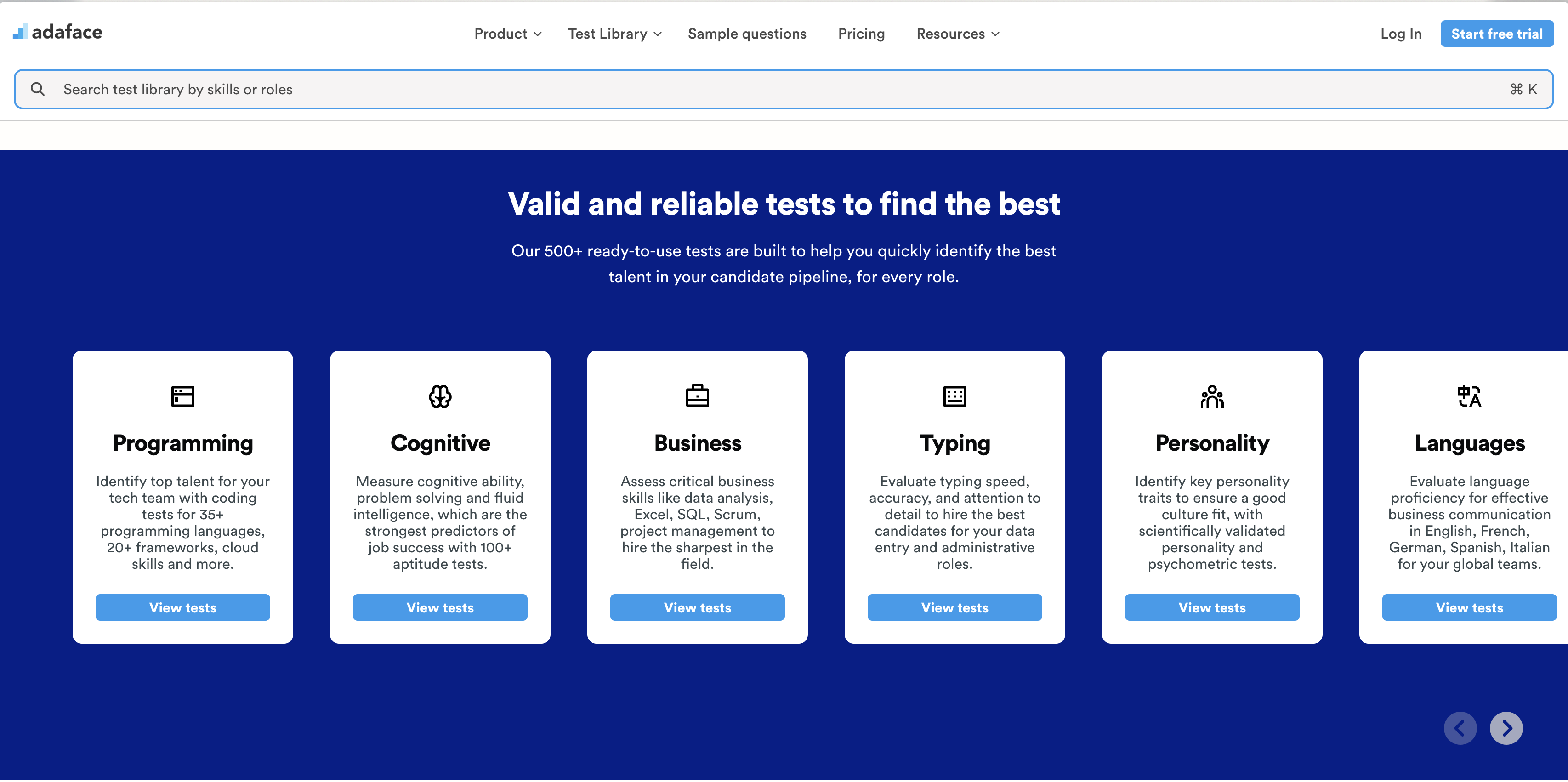
The Adaface test library includes a rich variety of assessments. You can find programming tests, business skills tests, and AI tests, among others.
Recruiters rely on Adaface for customized tests per job description. Whether it's coding or situational judgement, Adaface enables precise candidate assessments.
Using Adaface's test library is simple. Select the desired test, customize if needed, and share it with candidates. Adaface's ready-to-use tests streamline the recruitment process seamlessly.
Ducknowl's test library
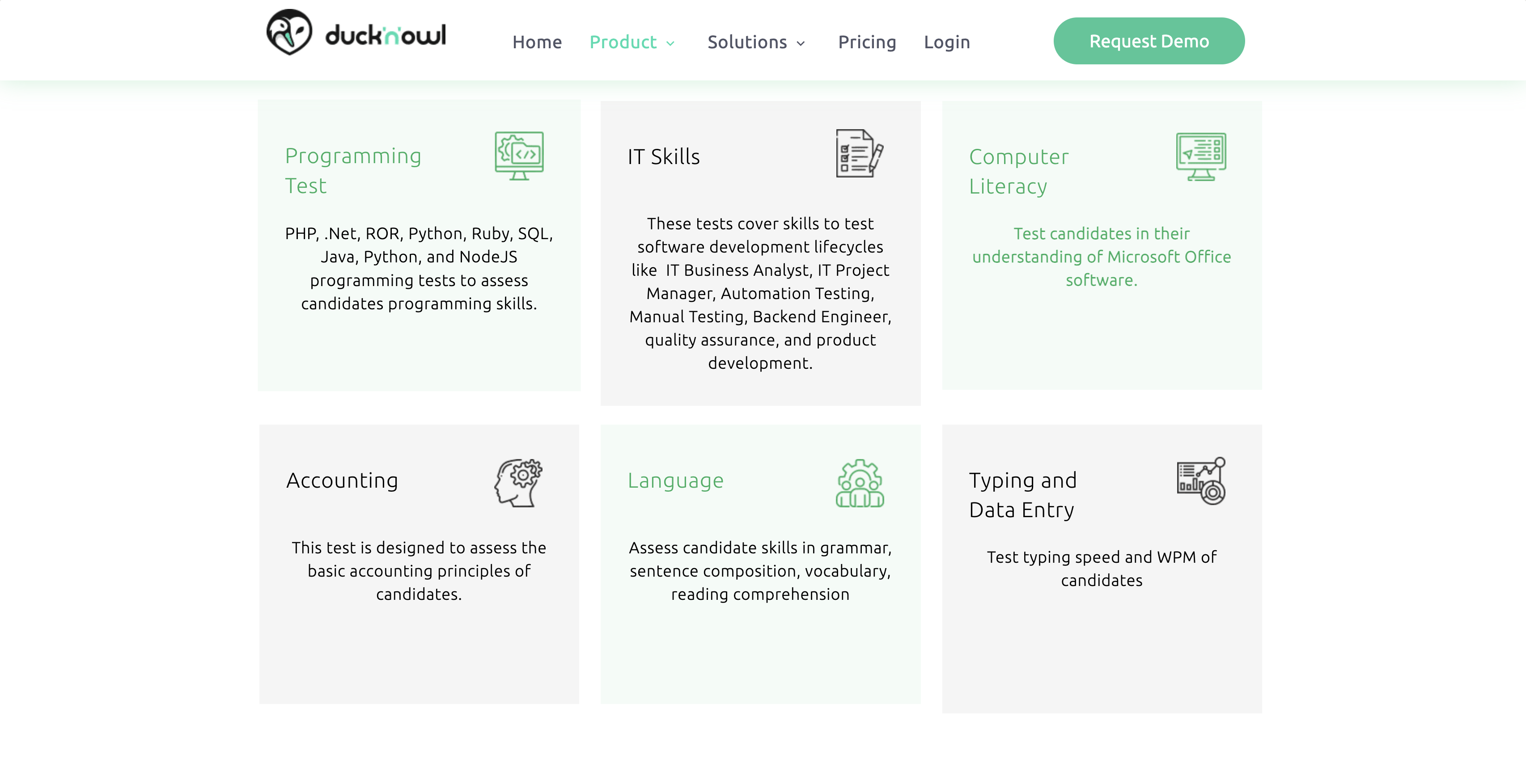
Ducknowl offers a variety of tests in its library, including programming, aptitude, typing, finance, and English language tests. It also features job-specific tests tailored for various roles.
For recruiters looking to quickly assess candidates' abilities in specific areas, Ducknowl's ready-to-use test library can be quite convenient. It allows for immediate deployment without needing to create custom questions.
However, Ducknowl's test library lacks situational judgment, personality, AI, and cloud-specific tests. Additionally, it doesn’t support the creation of custom questions or the ability to add your own, which might limit its flexibility for tailored assessments.
Comparison of test libraries
Adaface vs Ducknowl: Business, Marketing and Ops Roles
When hiring, you need to assess a candidate’s full range of on-the-job skills to see if they align with your team and workload.
Ducknowl offers a variety of tests for job-specific skills, but lacks some options like situational judgment and cloud skills, which are included in Adaface's extensive library.
Business, Marketing and Ops Roles with Adaface
Adaface provides over 500 tests to assess specific role-based skills, such as Microsoft Excel, Java, and Python. These include scenario-based questions that mimic real-world tasks.
Recruiters choose Adaface because it allows them to test candidates on actual job functions using custom, scenario-based questions. This ensures that candidates can perform tasks needed for specific roles.
Additionally, Adaface offers features like customizable tests and support for multiple languages, enabling recruiters to tailor assessments to their unique requirements. With these tools, you can easily evaluate if a candidate is a fit for your team and workflow.
Hiring Business, Marketing and Ops Roles with Ducknowl
Ducknowl offers a range of assessment options to screen candidates for non-developer roles. They provide aptitude and language tests, which can be used to evaluate candidates' logical reasoning and English proficiency. For roles requiring speed and accuracy, typing tests are also available.
Their test library includes ready-to-use job-specific assessments. These pre-configured tests allow hiring managers to quickly select assessments tailored to a variety of non-technical positions like finance. Recruiters can leverage these tests for immediate use without the need for extensive setup.
However, for roles that demand customized testing, Ducknowl's offerings are limited. The absence of situational judgment, personality, and business-specific tests, along with restricted language options, may leave gaps in assessing candidates comprehensively for certain sectors.
Adaface vs Ducknowl: Developer hiring
When hiring developers, you need a tool that covers the full spectrum of technical skills. Adaface offers a solid range of functionalities, making it a reliable choice for recruiters.
Ducknowl, while offering some coding questions, doesn't cover as many areas as Adaface. It lacks support for web frameworks, mobile frameworks, and more advanced functionalities like code playback and automated scoring.
Hiring developers with Adaface
Recruiters use Adaface to gauge a candidate's technical aptitude quickly and accurately with a mix of coding and scenario-based questions. It also offers custom coding questions that can tailor assessments to specific roles.
Another great feature is Adaface's code playback, allowing recruiters to see the coding process in action. With automated scoring, it removes the need for manual evaluation and speeds up the hiring process.
Hiring developers with Ducknowl
Ducknowl offers a suite of programming assessments to help employers evaluate developer candidates. They include questions for various programming languages, allowing recruiters to gauge applicants' coding skills. However, their range of developer-specific questions is somewhat limited.
Ducknowl's test library allows hiring managers to select from a variety of coding questions. This can be useful for creating assessments tailored to specific programming roles. However, the library's focus is more on general coding questions rather than specialized frameworks or technologies.
One area where Ducknowl falls short is in offering a broader variety of specialized coding questions, such as for web and mobile frameworks or SQL. Additionally, features like code playback and automated scoring are not available, which could make the assessment process less streamlined for recruiters.
Comparison of developer hiring features
Adaface vs Ducknowl: Candidate experience and company branding
Creating a fantastic candidate experience and strong company branding are key to attracting top talent. A candidate's first impression often comes from the assessment process, making it vital to get it right.
When evaluating platforms, look for features like mobile compatibility, email support, and help documentation. These can make a significant difference in candidate satisfaction and retention.
Candidate experience and company branding with Adaface
Adaface’s conversational interface stands out by making the test feel less like an exam and more like a chat, enhancing the overall candidate experience. This approach helps reduce test anxiety and often leads to higher completion rates.
Mobile-friendly assessments allow candidates to complete tests from any device, meeting the need for flexibility in the modern job market. Platforms like Adaface that support this ensure a wider reach and convenience for candidates.
Customizable templates for invitations, shortlists, and rejections help maintain a consistent brand voice. Adaface offers these features, ensuring that every touchpoint with the candidate reflects your brand's identity. For more tips on enhancing your candidate experience, visit our Crafting the Perfect Candidate Experience page.
Candidate experience and company branding with Ducknowl
Ducknowl's candidate experience leaves some room for improvement. While it offers email support for candidates, it lacks features like mobile support and online help documentation. This can make the journey feel a bit disconnected and less engaging compared to more modern platforms.
When it comes to company branding, Ducknowl doesn't quite hit the mark. There's no option for employers to add their logo or brand colors throughout the assessment process, meaning candidates see Ducknowl's branding instead of your company's. This could impact how candidates perceive your brand throughout their application journey.
A strong candidate experience and effective company branding can make a big difference in attracting top talent. Imagine a candidate taking an engaging test that feels personalized and reflects your company's identity—it's a game changer! However, Ducknowl’s current offerings might not fully support this vision, lacking customizable templates for invitations and rejection emails that align with your messaging.
Adaface vs Ducknowl: Anti-cheating features
Online assessments are a great way to evaluate candidates, but cheating can undermine the process. That's why anti-cheating features are crucial for any proctoring platform.
Anti-cheating features of Adaface
Adaface takes a multi-layered approach to prevent cheating during online tests. Here are some key features:
- User authentication: Candidates must verify their identity before starting the test.
- Webcam and browser monitoring: The platform tracks candidates' webcams and browser activity to ensure they don't switch tabs or receive external help.
- IP and device tracking: Adaface logs candidates' IP addresses and device fingerprints to detect if multiple tests are being taken from the same location or device.
But that's not all! Adaface also offers copy-paste prevention, full-screen mode enforcement, and protection against AI assistants like ChatGPT. With a 20,000+ question bank and multiple question sets, the risk of question leaks is minimized. And if a leak does occur, Adaface's social media monitoring helps identify and replace compromised questions quickly.
Anti-cheating features of Ducknowl
Ducknowl offers some anti-cheating measures to maintain test integrity. They include user authentication and time limits for the tests, ensuring that the right person is taking the test and that candidates complete it within a specified duration.
Such proctoring features can be useful for quick assessments where basic measures suffice to deter cheating. For example, user authentication helps verify the candidate's identity, while time limits add a layer of urgency that can make cheating more challenging.
However, Ducknowl lacks several advanced proctoring features like IP and location tracking, webcam monitoring, and full-screen enforcement. These missing elements can create opportunities for candidates to bypass basic security measures.
Comparison of anti-cheating features
Adaface vs Ducknowl: Pricing and free trial
Pricing for assessment platforms can vary significantly based on features, subscription models, and the scale of usage. Recruiters should look for transparent pricing that aligns with their hiring needs.
Adaface pricing
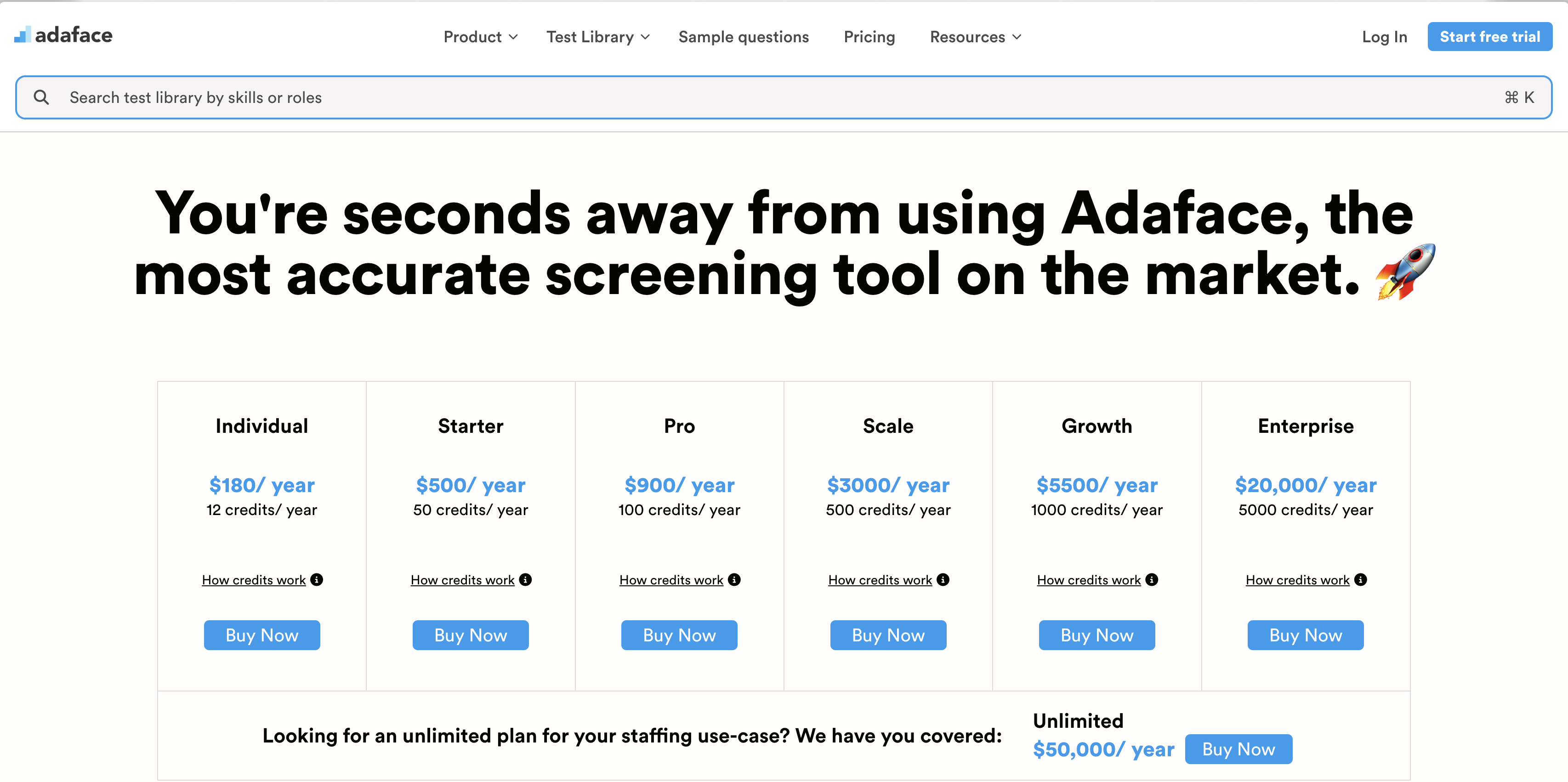
At Adaface, we provide a free trial with two sample tests and 5 credits so you can explore all features before making a purchase decision. We offer a range of pricing plans tailored to different hiring volumes and requirements. Our plans are designed to provide flexibility and scalability for companies of all sizes.
Here's a quick overview of our pricing options:
- Individual: $180 for 10 credits.
- Starter: $500 for 50 credits.
- Scale: $3000 for 500 credits.
- Growth: $5500 for 1000 credits.
- Enterprise: $20000 for 4000 credits.
Our pricing model ensures that you get the best value for your investment. Whether you're a startup or a large enterprise, our plans cater to your specific needs. To explore more about our plans, visit our Adaface Pricing page.
Ducknowl pricing
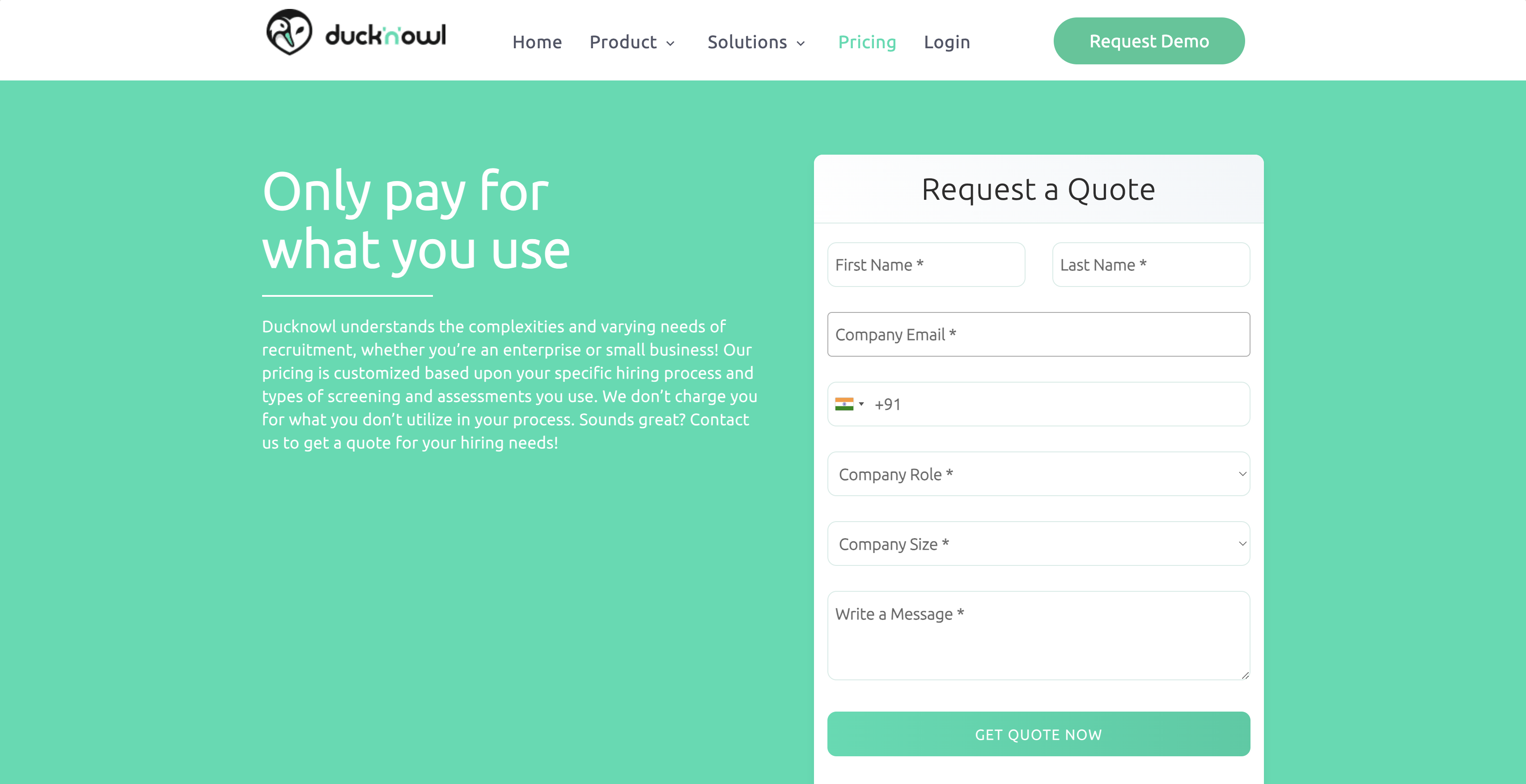
Ducknowl's pricing structure isn't exactly on the tip of your tongue. They require interested parties to reach out for quotes and details about their plans. Here’s a quick rundown of what’s typically available:
- Individual Plan: Contact Ducknowl for pricing.
- Starter Plan: Pricing details aren’t listed outright.
- Scale and Growth Plans: Again, specifics are elusive without a conversation.
- Enterprise Plan: Custom pricing based on needs.
- Unlimited Plan: Not mentioned, but who doesn't love unlimited options?
While flexibility may sound appealing, it can leave potential customers scratching their heads about which plan best fits their hiring needs.
While the mystery of Ducknowl's pricing can add an element of surprise, it also makes evaluating their offerings a bit of a treasure hunt. Without transparent pricing or the ability to explore all features upfront, recruiters might find themselves wishing for a clearer path to make informed decisions. After all, who doesn't want to know what they’re signing up for before committing?
Comparison of pricing
Adaface vs Ducknowl: Scorecards, reporting and analytics
Accurate scorecards, thorough reporting, and clear analytics are essential for recruiters to make informed hiring decisions. These features should enable a detailed comparison of candidates and streamline the evaluation process.
Adaface scorecards, reporting and analytics
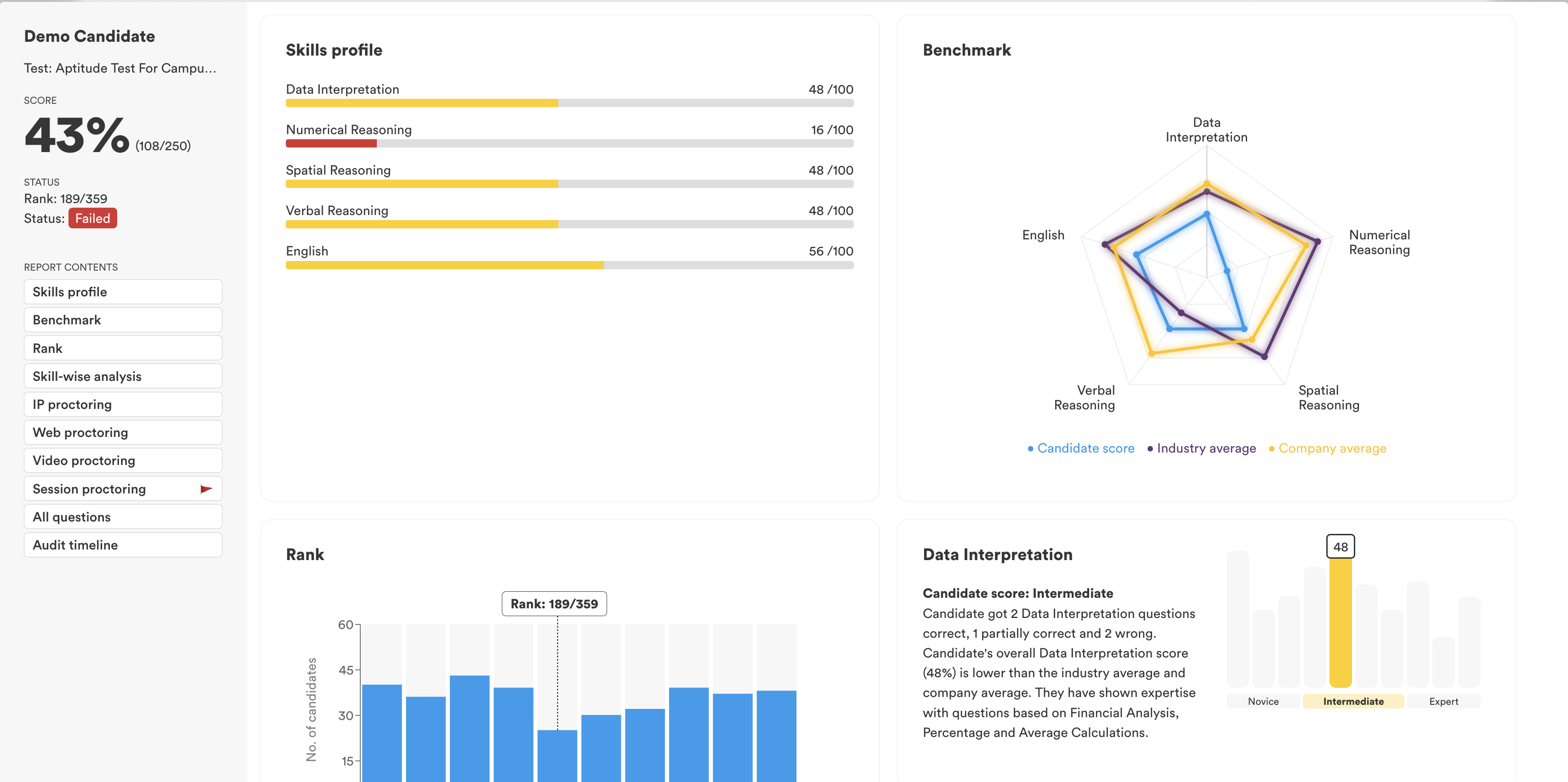
Adaface offers advanced scorecards, reporting, and analytics features. Recruiters can generate PDF reports, share public links for easy access, and export data in Excel and CSV formats.
The platform provides a skills profile with a radar chart showing candidate scores, industry benchmarks, and company averages for precise analysis. For a deep dive, recruiters can view detailed skill-wise analysis to see strengths and areas of improvement.
Adaface ensures a smooth hiring process with automated scorecard generation, real-time alerts, and a comprehensive overview where recruiters can compare multiple candidates across various skills. Check out the aptitude-test-graphic-designer-assessment scorecard and the data-science-test scorecard to see examples.
Ducknowl scorecards, reporting and analytics
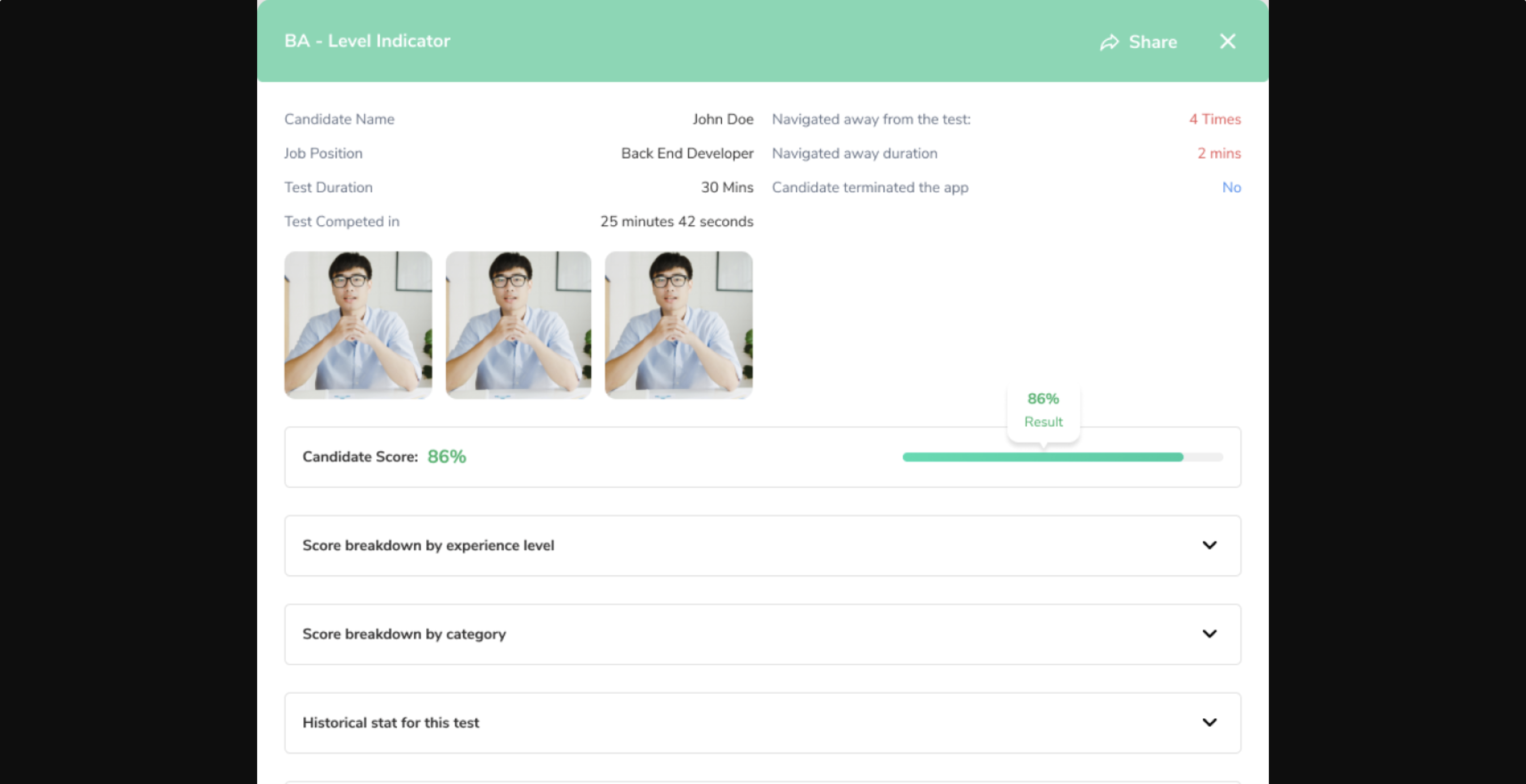
Ducknowl's reporting features are somewhat elusive. There is no clear mention of scorecard and reporting functionalities on their website, leaving potential users in the dark about what to expect.
For recruiters needing to share or analyze candidate data, the lack of information on export options like PDF, Excel, or CSV formats can be a drawback. This makes it challenging to know how well Ducknowl caters to these practical needs.
Moreover, without details on important features like skill-wise analysis, benchmarking, or audit timelines, it's hard to gauge how thorough Ducknowl's reporting really is. Recruiters might find it tricky to get a full picture of a candidate’s capabilities and performance.
Comparison of scorecards, reporting and analytics
Adaface vs Ducknowl: Enterprise and startup friendliness
For any pre-employment testing platform to be enterprise and startup friendly, it should offer features like ATS integration, API access, and role-based access control. These functionalities help streamline the hiring process while ensuring data security and compliance.
Adaface's enterprise and startup friendliness
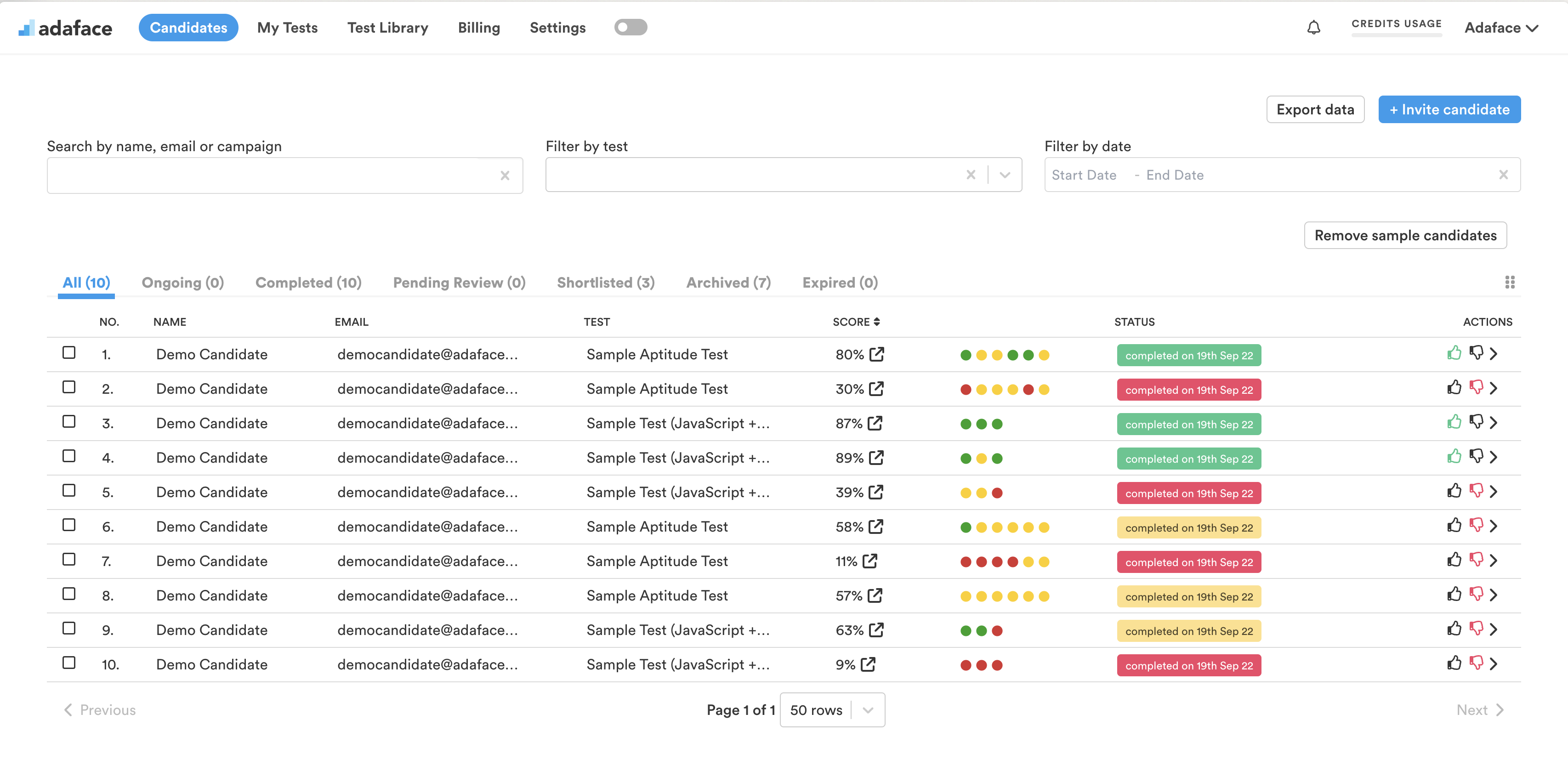
Adaface shines in its enterprise-friendly features, providing seamless ATS integrations and a custom API. This allows large organizations to integrate Adaface into their existing workflows without hassle.
Additionally, Adaface offers role-based access and unlimited team seats at no extra cost. This is particularly beneficial for enterprises managing extensive recruitment teams.
For startups, Adaface provides multiple invite options and bulk actions, making it easy to manage high-volume recruitment or campus hiring events. These features ensure that Adaface caters to the needs of both startups and enterprises effectively.
Ducknowl's enterprise and startup friendliness
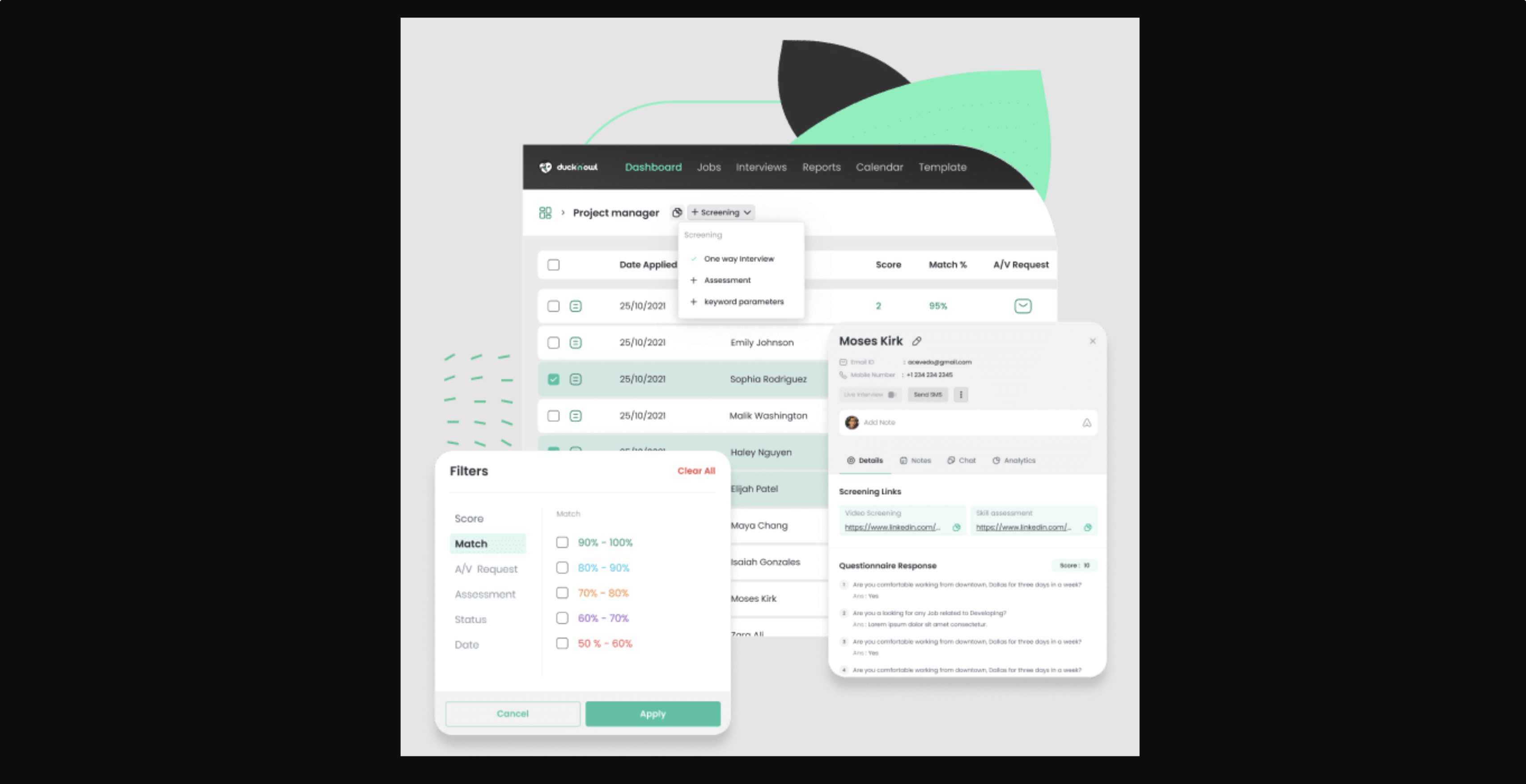
Ducknowl offers features like candidate tracking, interview scheduling, and customizable assessments, making it relatively easy for both enterprises and startups to manage their hiring processes.
The platform's ability to streamline interview coordination can really shine during high-volume hiring events, allowing teams to focus on finding the right talent without getting bogged down in logistics.
However, Ducknowl seems to lack a diverse test library and bulk action capabilities, which could make it challenging for businesses looking to scale their hiring efforts seamlessly.
Comparison of enterprise and startup friendliness
Adaface vs Ducknowl: Customer support
Adaface vs Ducknowl: Customer support can make all the difference in the fast-paced world of recruitment assessments. A responsive support team ensures that recruiters can quickly resolve issues and make the most of their chosen platform.
Adaface's customer support features
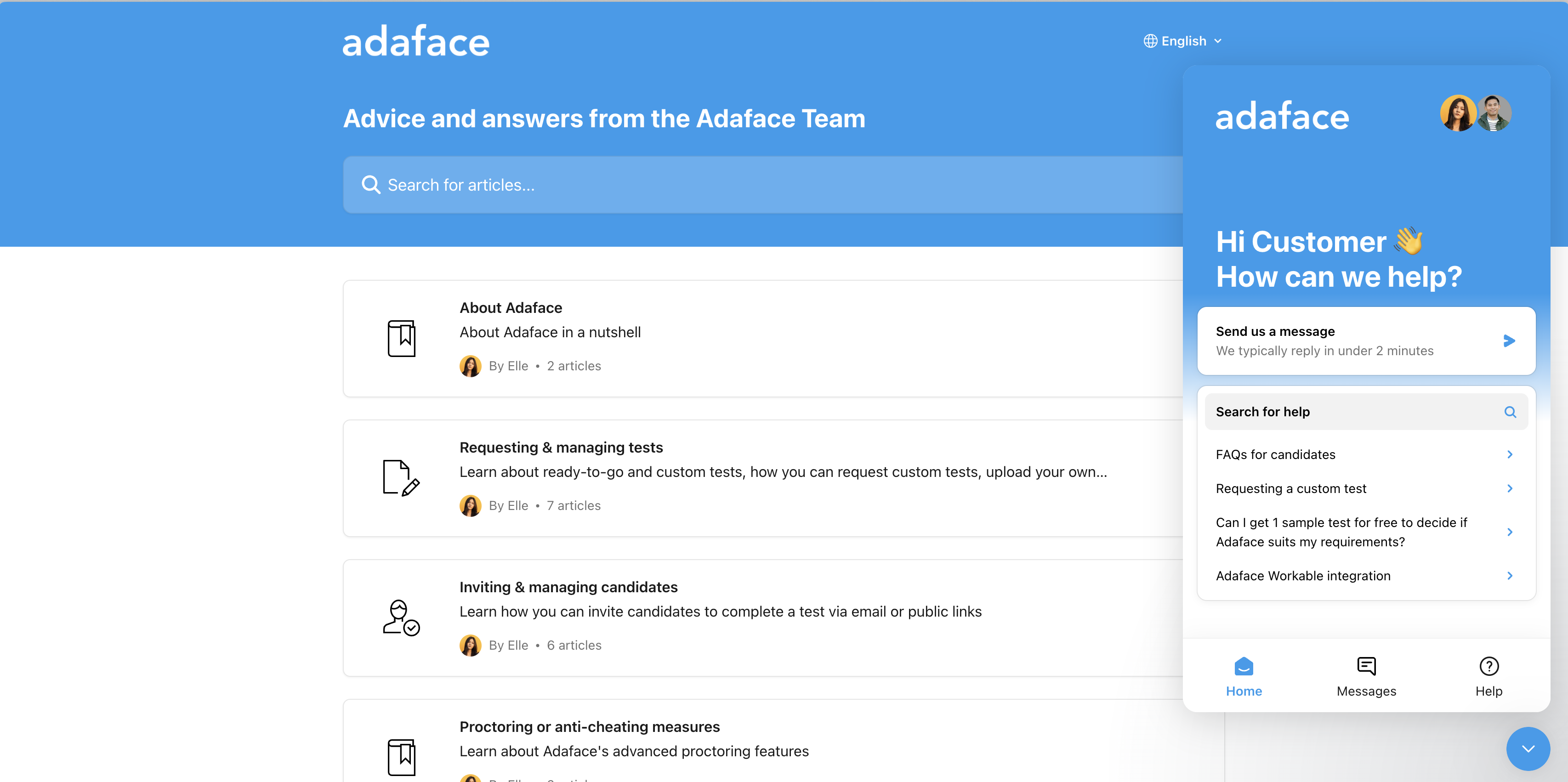
Adaface stands out with a variety of support options, including live chat, phone assistance, and email support. This means you can get help exactly when you need it—whether it's a quick question or a more complex issue.
In addition, Adaface offers a comprehensive Help Center filled with resources, guides, and FAQs to empower recruiters. It’s like having a treasure chest of knowledge at your fingertips!
For those on higher plans, dedicated priority support is available, ensuring that enterprise clients have a reliable point of contact for seamless communication. To explore all these features, visit our Adaface product tour or check out the Help Center for detailed assistance.
Ducknowl's customer support features
Ducknowl offers email support for users, allowing them to reach out with questions or concerns. However, they lack live chat options, which can make immediate problem-solving a bit tricky for recruiters.
While Ducknowl provides basic email support, they miss out on features like a dedicated help center or training resources that can guide users through their platform effectively. This can leave some recruiters feeling a bit lost when trying to navigate their hiring process.
Comparison of customer support
Adaface vs Ducknowl: Conclusion
Both Adaface and Ducknowl offer programming tests and aptitude assessments. They provide ready-to-use tests that recruiters can use quickly.
However, Adaface stands out with its wider range of test types. It offers situational judgment tests, personality assessments, and AI-related exams that Ducknowl doesn't have.
Adaface also allows custom questions and test creation based on job descriptions. This flexibility helps tailor assessments to specific roles.
Streamline hiring with skill tests
Another key difference is Adaface's focus on candidate experience. It has a conversational interface and mobile-friendly tests, making the process more engaging for applicants.
Pre-employment assessments help reduce bias in hiring. They save time by quickly comparing candidates based on skills rather than just resumes.
These tools also help evaluate culture fit, cognitive abilities, and job-specific skills. This gives a fuller picture of each candidate's potential.
Adaface offers the most complete solution for most hiring needs. Its wide range of tests and focus on user experience make it a top choice for companies looking to improve their hiring process.
Adaface vs Ducknowl FAQs
Adaface offers a wide range including programming, situational judgment, and aptitude tests, while Ducknowl offers programming and aptitude tests.
No, Adaface allows custom questions while Ducknowl does not support this feature.
Adaface supports multiple languages including French, German, and Spanish. Ducknowl only supports English.
Adaface has extensive proctoring features like webcam and IP tracking, while Ducknowl's proctoring capabilities are unclear.
Adaface provides clear pricing on their website, while Ducknowl requires you to contact for pricing details.
Adaface offers a free trial to explore features, whereas Ducknowl does not provide a free trial.

40 min skill tests.
No trick questions.
Accurate shortlisting.
We make it easy for you to find the best candidates in your pipeline with a 40 min skills test.
Try for freeRelated posts



